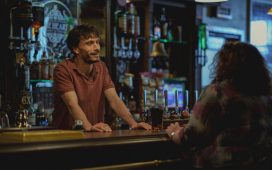Once again, we’ve been asked to watch the “Watchmen.”
“Lost” and “The Leftovers” mastermind Damon Lindelof set out to bring the complex, bleak and political “Watchmen” comics to HBO. Alan Moore and Dave Gibbons’ somber and seminal graphic novel was adapted once before, into a 2009 film directed by Zack Snyder, that proved a commercial and critical failure.
This “Watchmen” (Sunday, 9 EDT/PDT, ★★★ out of four) isn’t trying to tell the comics’ story of costumed heroes in an alternate version of the 1980s, in which Richard Nixon is still president and nuclear war with the Soviet Union is around the corner. Instead, HBO’s series marks a continuation of that narrative, a far-flung sequel set in a familiar but distinct version of 2019. Its main focus is race and the criminal justice system rather than nuclear armament.

This “Watchmen” is a huge undertaking, a complex story with as many plot threads as a squid has tentacles (and yes, there’s a squid). Like the original, it has a lot to say, and is gorgeously realized with strong writing and performances, particularly from stars Regina King and Jean Smart.
But its messaging is somewhat muddied. Like much of Lindelof’s work, “Watchmen” has conflicting themes, selective points of view and multiple timelines, which in the six episodes made available for review are balanced fairly well. But a show juggling so many elements always has the potential to come tumbling down.
As in the graphic novel, Lindelof’s “Watchmen” has a murder mystery that’s part of a greater political one: A white police officer in Tulsa is lynched in the midst of a long-running conflict between the police force and a white supremacist terrorist group known as the Seventh Kalvary, a plot fraught with meaning from the very beginning.

In the world of the series, Robert Redford has been president since 1992; there is no Internet or cellphones; baby squids rain from the sky; and police officers wear masks to protect their identities. The cops take on monikers and costumes not unlike the costumed “vigilantes” who have been outlawed since before the events of the original comics.
Our way into this world is through Angela Abar (King), a Tulsa detective who goes by “Sister Night” when wearing her unconventional uniform. She becomes obsessed with investigating the murder, which leads her to a mysterious old man (Louis Gossett Jr.) and eventually puts her in conflict with Laurie Blake (Smart), whom fans will recognize as original comics character Silk Spectre. Laurie is now an FBI agent, but she finds little enjoyment in life and leaves riddle-filled voicemails for her ex Dr. Manhattan, who has abandoned humanity to live on Mars. Jeremy Irons also appears as villain Adrian Veidt, who lives in seclusion.

The strength of “Watchmen” is its talented cast – which also includes Don Johnson, Hong Chau and Tim Blake Nelson. Like “Lost,” the best episodes are character-driven and laden with flashbacks. The graphic novel was one of the first to demystify the benevolent superhero and delve into the darkness of power, but now we have dozens of films and TV series that have added hardened edges to our heroes. The writers were wise to create superheroes that are not just flawed, but flawed in new and achingly relatable ways.
Smart is without a doubt the series’ highlight, and it’s a shame that she isn’t introduced until Episode 3. Her wry, exhausted delivery of her lines is pitch perfect for a jaded Laurie, who’s both familiar to comics fans and instantly understandable to newbies. Her interplay with King is superb: It’s a pleasure to watch two award-winning actresses sparring like they’re in an Olympic boxing arena in scenes as riveting as any moment of violence or action the series has to offer.

But things get murkier when “Watchmen” turns its focus to race. Lindelof has said that he wanted to tackle the 2019 political equivalent of the comics’ commentary on the Cold War, and “it felt like it was undeniably race and policing in America.”
Perhaps after seeing the three remaining first-season episodes, the thesis will come into shocking relief, as Lindelof has promised critics and fans. But two-thirds of the way in, it’s hard to parse what the series is trying to say, other than to point out that racism is bad and even well-intentioned institutions are built on a systemically racist foundation. This isn’t a bad moral, but there’s a staggering amount of violence employed against black people to make the argument, a display of pain and suffering that verges on exhibitionist at times.
Lindelof is right that racial politics are a huge part of America in 2019, and it seems like an obvious topic for something as sweeping and complex as “Watchmen” to tackle. But especially when thrown in with so many other narrative elements, the finer nuances of a centuries-old problem can be hard to come by.
So much energy as is spent on the sociopolitical elements of the series, but “Watchmen” is at its best when it tries a little less hard to be profound and instead focuses on the fascinating and deep cast of characters. Even in an age of superheroic saturation, “Watchmen” stands out for its richly drawn characters and restrained special effects.
It will never have the impact or acclaim of the comics, but if it can stick a very difficult landing, maybe it proves the “Watchmen” are worth watching after all.













